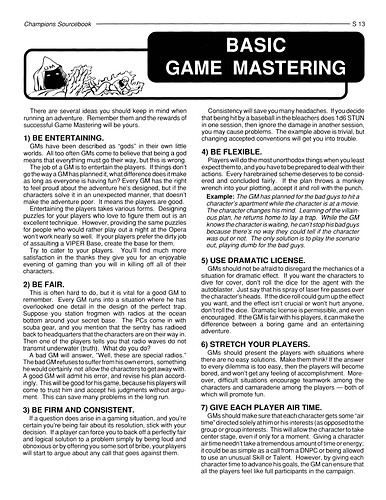These are the rules I have found useful in 45+ years of game mastering. They are not intended to be used dogmatically or pedantically. Judgment as always applies.
Basic GMing Rules
1: Garry’s First Rule of Fantasy
A) Do not change reality more than necessary to make your Universe work. Real world physics are your friend, you do not need to explain gravity, weather, or in general how the world functions. So don’t complicate things that do not require complication. Adding super science or magic is complication enough.
B) All role-playing games are fantasy, even if it is not. Of course it’s fantasy, if it was real you would be living it, not playing it in a game. Even the modern games or science fiction games are a fantasy.
"C) Fantasy is not an excuse for sloppy writing or world building. Never ever. "“Fantasy” is not an excuse word that means you don’t have to do your homework or keep track of things. Good fantasy is internally consistent. We do wish to write a good fantasy.
And we do want good writing. When I was talking with Melissa Scott at ConFusion and Her Friends (local SF convention) some years ago (2003) I mentioned running a D&D game for 27 years (at the time) Her eyes got as big as saucers and she said “That is writing too!” So you have it from a pro, and a well educated one. Your RPG writing is writing. Treat your game with respect, take writing it seriously and it will furnish you and your friends decades of enjoyment. Last note, just don’t take yourself seriously.
2: It is Your Game
It might be their system, but it is your game. At some point you have to say “we start here”. From here on end everything has to audition to get in. Just because Turkey Shit Rules or Lizards of the Coast wrote it is not a free pass. YOUR GAME. Even if you use a published setting. YOUR GAME. The next supplement for the World of Weeniecraft does not get a free pass, you need to approve it no matter how kewl Player X thinks the Hot Dog Cart of Doom is. YOUR GAME. If you want a good game you must take ownership.
3: Write to your audience
Know your players. Ask what they like and what they want to see in the game. Vital, ASK. Don’t assume, poll the players, inquire and check things out. Their role in the game is as important as yours.
On that note seek adventures of mutual enjoyment. If you are a sea adventure bunny (like me) and your players are not (like mine), then don’t write sea adventures. Write something you both like. You are part of your own audience. If you don’t like what you are doing it will show and enjoyment will be lessened.
Explore the limits, but be careful. Pushing the limits can be a good thing if you do not push then too far… Push people’s limits too far and they get uncomfortable. uncomfortable people are not having fun. People that are not having fun stop coming. Don’t even go there if you do not know your players very well indeed. It’s a game, not a psychological test.
4: The Rule of Yes
A) Unless there is a compelling reason to say no, say yes. Playing a game with Dr. No isn’t any fun. Players want to have fun and to do things. There is a time and place for obstacles, learn and know that time and place. Trying to find a royal blue shirt or spell components in the market is not that time.
B) A roll is not required for everything, even if a roll is required. Use judgment in applying the dice. Dice are random, random isn’t vital even if the rules say it is. Remember the Rule of Yes.
5: Keep encounters open ended
A) An encounter with one solution is bad. I do not write encounters with a solution in mind. I present the problem, and let the players tell me how it will be solved. Remember they are creative too. Use that.
B) Frustrated players are bad. Look back to the Rule of Yes. If your players cannot solve something because you wrote in a single solution they didn’t think of, they get frustrated. This makes the GM look bad.
C) Use any reasonable solution, be open to solutions you didn’t think of. As above, rule of yes and keep an open mind. You have one brain, your players have one each. Use the brains around you to improve the game.
6: BE FLEXIBLE
A) Don’t script. Players will do the unpredictable. And that is that. You want north they go south. You have the old gypsy with the legend they visit everyone but. When that happens, punt. If an encounter is important, it can be fit in elsewhere. Only you know how the scenario is assembled. No one will smite you if you shuffle the parts. If the Vicar has the legend and not the Gypsy you don’t loose GMing points.
B) Let go. You are not in control, you were never in control and you will never be in control. The game is not about you the GM or your NPCs. The Player Characters are the Stars. Anything you do to derail that is bad, and anything you do to enhance it is good.
Most Important, have fun. The game is played for fun. If everyone is having fun, you are a successful GM.
© Garry Stahl: 2009. All rights reserved, re-print only with permission.
